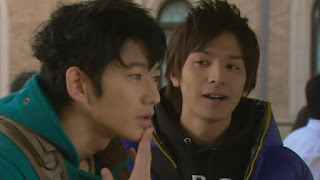Title: ヴォイス Vuoisu (Voice)
English Title: Voice
Country: Japan
Language: Japanese
Year: 2009
Episode: 11
Cast:
- 瑛太 Eita
- 生田斗真 Ikuta Tōma
- 石原さとみ Ishihara Satomi
- 遠藤雄弥 Endo Yuya
- 佐藤智仁 Sato Tomohito
- 時任三郎 Tokito Saburo
- 矢田亜希子 Yada Akiko
- 泉谷しげる Izumiya Shigeru
- さとう里香 Satō Rika
SYNOPSIS
グリーン Green - 刹那 Setsuna (Moment)Kaji Daiki fails to get into a popular heart surgery seminar but is somehow accepted into the forensic pathology seminar. When he approaches Professor Sagawa and asks him why he ended up in the seminar, the professor challenges him by asking why he wants to study heart surgery. Daiki replies that medicine is meaningless after the heart stops, but the professor counters that medicine also applies to the dead.
A group of five medical students take on the task of exploring the mysteries of death and conveying the 'voices of the dead'. Kaji Daiki, Ishimatsu Ryosuke, Kuboaki Kanako, Kirihata Teppei and Hanei Akira pursue forensic pathology but they didn't really know what they are getting themselves into.
REVIEW
I like how the medical students have varying personalities and images: Kaji Daiki is talented and exceptionally smart, Ishimatsu Ryosuke is popular and happy-go-lucky, Kuboaki Kanako is average and goody-goody, Kirihata Teppei is a nerd and an otaku, and Hanei Akira is street-smart and so-called 'tough guy'. Different people can become medical professionals and sometimes, having people from different backgrounds is better for mystery-solving purposes because each one can contribute something to the discussion.
I like how these very different people became close friends initially because they are in the same forensic pathology seminar but eventually because they all want to explore the mysteries of death. Personally, what I enjoyed the most in the drama are the scenes where all five of them are sitting around and eating together.
Although the drama is about forensic pathology, the focus is less on the actual process of conducting autopsies on dead bodies. It seems as if actual tests and studies on the bodies are done behind the scenes. The medical students figure out the cause of death by visiting the area where the person died and by talking to the dead person's relatives, colleagues, and friends.
I'm a little bothered by how the medical students conducted their investigations in conveying the 'voices of the dead', particularly in terms of finding out how the person died. As medical students who should conduct autopsies on dead bodies, doing investigative work is going too far and definitely out of their job description.
###
ヴォイス Voice







